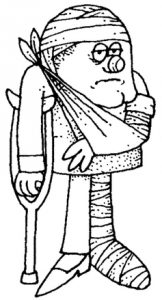This memo was written by me for an upcoming workers’ compensation trial. The key issue in the case is whether Florida’s “120-Day Rule” (F.S. 440.20(4)) will preclude the Employer/Carrier from denying the compensability of a number of claimant’s injuries and medical conditions. If the answer is Yes, the Claimant should be awarded Temporary Partial Disability Benefits (F.S. 440.15(4).
CLAIMANT’S TRIAL MEMORANDUM PURSUANT TO RULE 60Q-6.116(7)
COMES NOW the Claimant, by and through his undersigned counsel, and files this, Claimant’s Trial Memorandum Pursuant to Rule 60Q-6.116(7):
POSTURE OF THE CASE
- Final Hearing is scheduled for November 30, 2020.
- The only claim to be heard at the Final Hearing is TPD from March 9, 2019 to April 21, 2020.
- E/C’s defenses are:
All TPD due or owing. The claimant has reached overall MMI, with a 0% PIR, and no restrictions, three months following the date of accident per the opinion of E/C IME Dr. Fernandez.
Based on the opinions of Dr. Fernandez and the February 5, 2019 MRI report, the claimant has suffered an intervening trauma that has broken the causal chain. Thus, the MCC of the need of any future medical treatment or loss of earning is not the July 19, 2016 industrial accident.
- Claimant replied to E/C’s defenses as follows (ID102):
Contrary to E/C’s unsubstantiated assertion, the claimant has not “reached overall MMI, with a 0% PIR, and no restrictions”; (2) E/C’s IME doctor limited his MMI, PIR, and restrictions opinions to a Grade I ankle sprain. He failed to express opinions on these subjects with regard to the claimant’s many other compensable injuries, as determined by Kenneth Hodor, M.D., claimant’s authorized orthopedist, and for which E/C has been providing benefits since on or about March 26, 2019. Accordingly, this is the only compensable injury for which there can possibly be a difference of opinion between E/C’s IME doctor and Dr. Hodor, thus limiting the scope of the EMA’s opinions regarding MMI, PIR, and restrictions to the Grade I ankle sprain only; (3) By virtue of the “120-Day Rule”, E/C has waived any right it may have had to contest that claimant’s injuries, as determined by Kenneth Hodor, M.D., including those revealed by the February 5, 2019 right ankle MRI, arose out of, and occurred within the course and scope of the claimant’s employment. Therefore, E/C should be estopped from defending the claim for TPD by challenging the compensability of claimant’s injuries.
Neither legally nor factually has the claimant “suffered an intervening trauma that has broken the causal chain.” In actuality, E/C’s “intervening trauma” defense is a preexisting condition defense, albeit one without a factual basis, under § 440.09(1)(b), Fla. Stat.; (2) By virtue of the “120-Day Rule”, E/C has waived any right it may have had, whether based on the theory of “intervening trauma” or of a preexisting condition, to contest that claimant’s injuries, as determined by Kenneth Hodor, M.D., claimant’s authorized orthopedist, arose out of, and occurred within the course and scope of the claimant’s employment. Therefore, E/C should be estopped from defending the claim for TPD by challenging the compensability of claimant’s injuries; (3) E/C has interjected an issue – “the MCC of the need of any future medical treatment” – which has not, heretofore, been at issue, and is not presently at issue. E/C has not denied any medical care, therefore, claimant has not had the need to file a claim for authorization of medical care. As no such claim is presently ripe for adjudication, the Pretrial Stipulation does not include any claim for same. Claimant does not consent to trying this issue at the upcoming Merit Hearing.
FACTS
- The Accident. Claimant stepped into a hole with his right foot. He twisted his right ankle, lost his balance and fell onto his side. E/C accepted compensability of the workplace accident.
- E/C authorized these medical providers as primary care physicians:
Port of Miami Medical Clinic/Irwin M. Potash, M.D.
Ortho Assoc. of South Broward/Dr. Steven Steinlauf
Kenneth R. Hodor, M.D., P.A./Kenneth R. Hodor, M.D.
- Dr. Potash last saw the Claimant on August 2, 2016. Dr. Steinlauf saw the Claimant once, on September 7, 2018. He noted that the Claimant had an antalgic gait on the right. He administered an injection in the right ankle and provided the Claimant with an AFO brace and an ankle support brace. Dr. Hodor was authorized and has seen the Claimant a total of seven (7) times, from January 29, 2019 to April 29, 2020. He remains authorized. From the first appointment to the last, Dr. Hodor has opined that the Claimant has functional restrictions and is not at MMI as a result of injuries sustained in the industrial accident.
- On the first examination, Dr. Hodor found an increase in girth on the right foot as compared with the left, a right antalgic gait, and tenderness in the right foot that was not present in the left. Right ankle x-rays performed that day revealed areas with degenerative changes. Dr. Hodor reported to the carrier that “the work related injury is the major contributing cause of the onset of the current symptoms in the right lower extremity.” His DWC-25 diagnosis is: “719.07 R Post tibial tendinitis.” He felt that a trial of anti-inflammatories was reasonable and necessary. Transdermal gel was provided. He also prescribed a course of therapy to the right ankle. He ordered an “MRI of the right ankle to rule out a partial tear of the posterior tibial tendon and/or any evidence of loose bodies.” Restrictions of minimize repetitive climbing stairs and ladder and squatting over the right ankle were imposed.
- E/C authorized the MRI, pharmaceuticals, and physical therapy. The MRI was performed on February 5, 2019. The findings were reported as follows:
Tear of the anterior talofibular and anterior tibiofibular ligaments.
Sprain of the posterior talofibular and posterior tibiofibular ligaments.
Sprain with partial tear of the calcaneofibular and deltoid ligaments.
Bone marrow edema pattern suggesting bone bruise of the medial malleolus and adjacent medial aspect of the talus.
Peroneus brevis and longus tendinosis.
Distal posterior tibialis tendinosis.
Instrasubstance longitudinal partial tear and focal plantar tear of central slip of the plantar fascia.
Tibiotalar joint effusion with posterior superior capsule ganglion.
Tibiotalar joint marginal osteophytes, subchondral remodeling and cartilage thinning.
- In Claimant’s first follow up appointment, on March 26, 2019, Dr. Hodor read the MRI report and images. He reported the MRI images as demonstrating “multiple abnormalities including the following: 1) tear of the anterior talofibular ligament with reactive edema; 2) a high signal was noted within the posterior talofibular ligament consistent with a sprain; 3) tear of the anterior tibiofibular ligament with reactive edema; 4) sprain of the posterior tibiofibular ligament; 5) sprain with partial tear of the calcaneofibular ligament; 6) sprain with partial tear of the deltoid ligament and again adjacent reactive edema and bone marrow edema in the adjacent medial malleolus and adjacent talus. There was noted to be an intact spring and bifurcate ligament.” He also interpreted the MRI images as showing: “a high signal and thickening of the peroneus brevis and longus tendons of the distal to the lateral malleolus consistent with tendinosis. There was a prominent peroneal tubercle and a high signal evident with the distal insertional posterior tibial tendon at and proximal to its insertion at the navicular/medial cuneiform, again reflecting tendinosis.” Dr. Hodor reported that Clamant continued to demonstrate an antalgic gait on the right and “fullness or swelling about the right ankle compared with the left.” The same restrictions as before were maintained. His handwritten DWC-25 diagnoses is “Varus Arthritis R ankle; tears of multiple ligaments ATFL PTFL; tearing anterior tibio-fibular, sprain of posterior tip-fib lig, partial tear unable to decipher lig.”He prescribed physical therapy for Claimant’s “R Ankle/Foot” and pharmaceuticals. He indicated that the injuries were the major contributing cause for the treatment recommendations and functional limitations and restrictions. E/C authorized the prescriptions.[2]
- Hodor next saw the Claimant on May 7, 2019. In his typed report of this date, he informs E/C that Claimant “does have varus ankle arthritis which certainly preceded his injury but has been aggravated by it. He is going to continue with physical therapy and I will see him again in 6-8 weeks. There has been no change in his work status.” His DWC-25 diagnosis is: “719.07 R Post tibial tendinitis.” PT and pharmaceuticals are prescribed. Dr. Hodor advises E/C that the “Injury/Illness for which treatment is sought is work related. E/C authorized everything.
- In the June 18, 2019 appointment, Dr. Hodor advises the Claimant to avoid “any impact type activities” and to use his ASO brace. He again informs E/C that the reason for the medical treatment is work related. His DWC-25 diagnosis is: “R 719.07 Posterior tibial tendinitis R.”
- In the next appointment, on August 20, 2019, Dr. Hodor elicited tenderness and detected soft tissue fullness. He decided to write a prescription for a Vector ankle/foot orthotic brace “to see whether that may give him some additional support.” The handwritten DWC-25 diagnosis, which I am unable to decipher in full, includes at least two ligament tears. E/C authorized the brace. Claimant’s work restrictions remain the same and he is still not at MMI.
- On February 19, 2020, now more than one year after his first appointment with Dr. Hodor, Claimant’s examination continued to “reveal evidence of fullness posteromedially,” tenderness, and “restricted hindfoot mobility.” Dr. Hodor reminds E/C of his previous diagnosis of “tenosynovitis of the posterior tibial tendon on the right superimposed on his varus osteoarthritis of the right ankle,” and notes the ligament tearing demonstrated in the February 5, 2019 MRI. His DWC-25 diagnosis is: “R Ankle Synovitis; R Ankle Varus Ankle arthritis.” Claimant’s medications are renewed. Dr. Hodor indicates that the need for the medical treatment is work related. Claimant’s work restrictions remain the same and he is still not at MMI.
- Dr. Hodor last examined the Claimant on April 29, 2020. X-rays were performed. In his typed report to E/C, Dr. Hodor writes: “As noted, his prior MRI showed multiple ligament injuries.” Ongoing therapy is prescribed to his ankle and it is recommended that Claimant be fitted for a “custom device for his shoe once we have to order this and get him fitted when the pandemic allows.”
- Dr. Hodor was deposed on April 20, 2020. This is the first time anyone acting on E/C’s behalf asked Dr. Hodor questions about the case. In Dr. Hodor’s opinion, the February 5, 2019 MRI demonstrates that the ligaments supporting both sides of the right ankle, the medial or inner side of the ankle and the lateral or outer side of the ankle, were torn and stretched in the accident, resulting in “a disbalance of muscular tendinous forces in the ankle.” He described this as “an acute injury superimposed on pre-existing degenerative changes.” In his words, “[T]here [are] a lot of interacting pathologies going on in … this patient,” including “a muscle and bone imbalance situation” and reactive edema. He went on to say that the “torn ligaments aren’t going to resolve, they’re scarred out.” Dr. Hodor also opined that the accident has caused the underlying Varus Arthritis to progress more rapidly. Finally, Dr. Hodor explained that if conservative care, consisting of physical therapy, anti-inflammatories, and a custom orthotic fail to achieve satisfactory results, surgery in the form of “an arthrodesis of the foot and ankle or a triple arthrodesis, which is a big operation,” might be indicated. On a cross examination question from E/C’s attorney, Dr. Hodor answered that if surgery has to be performed, “It’ll be greater than 51% related to the injuries he sustained.” As of the date of the deposition, the Claimant was not at MMI and he continued to have functional restrictions.
DISCUSSION
- E/C owns all of the injuries and conditions diagnosed and treated by Dr. Hodor. E/C’s intervening trauma defense does not relieve it of this obligation. In North River Ins. Co. v Wuelling, 683 So. 2d 1090 (Fla. 1st DCA 1996) (en banc), the Court held that an E/C which pays compensation or intentionally provides benefits, but fails to deny compensability within the 120 days provision set forth in section 440.20(4), Florida Statutes, waives the right to contest that an injury “arose out of, and occurred within the course and scope of the claimant’s employment.” North River at 1092; see also s. 440.192(8), Fla. Stat. (2011) (“A carrier that does not deny compensability in accordance with s. 20(4) is deemed to have accepted the employee’s injuries as compensable, unless it can establish material facts relevant to the issue of compensability that could not have been discovered …”) E/C waited until August 19, 2020, to first deny the compensability of Dr. Hodor’s care.
- E/C wants the Court to believe that the only compensable injury which it is obligated to cover is an ankle sprain. This is the only injury Dr. Fernandez (E/C’s IME), Dr. Steinlauf, and Dr. Brill (EMA) attribute to the accident. In contrast, Dr. Hodor believes that the accident is the MCC of a much broader and more serious range of injuries and conditions as described above. Since Dr. Hodor has been authorized since January 29, 2019 without challenge, it is estopped by operation of law from now contesting the compensability of the injuries he diagnosed and treated. See North River at 1092; see also s. 440.192(8), Fla. Stat. (2011) (“A carrier that does not deny compensability in accordance with s.440.20(4) is deemed to have accepted the employee’s injuries as compensable….”)
- E/C claims that a sprained ankle is the only injury for which it authorized treatment before Dr. Hodor became Claimant’s primary care physician. Accordingly, it contends that this is the only injury for which it can ever be responsible. This position fails to recognize how the “120-Day Rule” works. Teco Energy, Inc. v. Williams, 234 So. 3d 816 (Fla. 1st DCA 2017) shows what E/C is missing:
The “120-Day Rule” is not necessarily rendered obsolete on the 121st day after the first report of accident and initial installment of benefits. The rule remains viable and is again triggered when, and if, a new condition or injury arises. Snyder, 765 So.2d at 754; Boyle v. JA Cummings, Inc., 212 So.3d 1060, 1062-63 (Fla. 1st DCA 2017) (holding JCC erred by excluding adjuster’s testimony concerning specific identity of condition accepted as compensable as it related to application of subsection 440.20(4) to preexisting condition); McIntosh v. CVS Pharmacy, 135 So.3d at 1157, 1159 (Fla. 1st DCA 2014) (“It was of no consequence that compensability [of the claimant’s PTSD] was sought long after the date of the accident; the relevant inquiry is whether the E/C denied compensability within 120 days of first providing treatment for the PTSD.”).
 Florida Injury Attorney Blawg
Florida Injury Attorney Blawg










